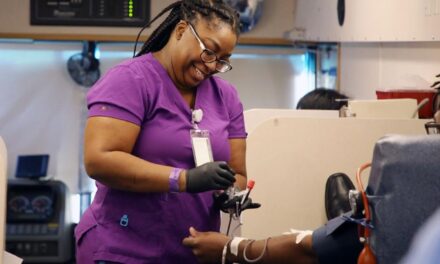
LIEUTENANT GOVERNOR AUSTIN DAVIS, left, announces along with DCED Secretary Rick Siger the state’s new Historically Disadvantaged Business Assistance Program. (Photo by Rob Taylor Jr.)
When it was time for Derrick Wilson to speak, the CEO of The Wilson Group, a Black-owned company with its home offices just feet from Pittsburgh in O’Hara Township, didn’t have to say too much.
In effect, he let the media and other members in attendance, including Pennsylvania’s Lieutenant Governor and Pa. Department of Community and Economic Development Secretary, look around and smell the $27 million in revenue the company generated in 2023.
Wilson is the leader of the company that focuses on being the premier provider of document workflow solutions in the region. Need a copy machine, or printer, or scanner? Wilson’s got it. Best Records Management? Wilson’s got it. Security systems? Wilson’s got that, too.
The Wilson Group is an example of a successful minority-owned business. Lieutenant Governor Austin Davis and DCED Secretary Rick Siger want to see more historically disadvantaged businesses have success, which is why they announced at The Wilson Group’s offices on Delta Drive the opening of the Historically Disadvantaged Business Assistance Program.

THE HISTORICALLY DISADVANTAGED BUSINESS ASSISTANCE PROGRAM WAS ANNOUNCED AT THE WILSON GROUP IN O’HARA TOWNSHIP, DEC. 16, 2024.
Community nonprofits, economic development organizations and educational institutions have until Jan. 22, 2025, to submit a funding application to the state. The organization must have a plan to open a Business Assistance Service Center, which would then be accessed by, among other groups, Black-owned businesses, for empowerment and support. That support could mean anything from technical assistance to access to capital and boosting the overall number of diverse small businesses.

DERRICK WILSON, CEO OF THE WILSON GROUP. (PHOTOS BY ROB TAYLOR JR.)
For Lt. Gov. Davis and DCED Secretary Siger, they felt it was important that the state “sub-grant” the funding dollars to local organizations “that really know their communities well,” Siger said during the Dec. 16, 2024, news conference at The Wilson Group.
“When we support small diverse businesses, we are supporting economic growth and job creation here in the Commonwealth,” Lt. Gov. Davis said. “We’re supporting revitalization in our communities that have been often left behind for far too long and we are helping Black and brown families create generational wealth.”
Lieutenant Governor Da vis, a Black man from McKeesport, has continuously made announcements that directly affect the Black community in a positive manner. Last month, in December 2024, the state’s first Black Lieutenant Governor announced the state won a $4 million federal grant to combat gun violence, called the Community Violence Intervention and Prevention Initiative grant. He was in New Castle in November 2024 announcing $3.04 million in grants were earmarked for local law enforcement agencies to help them attract high-quality recruits. And in September 2024, Lt. Gov. Davis was instrumental in announcing that organizations could apply for grants to combat violence and offer enriching after-school learning opportunities, called the BOOST Program. “BOOST” is an acronym for “Building Opportunity through Out of School Time.”
“We’re adopting a comprehensive strategy to tackle the root causes of violence and make our communities safer,” Lt. Gov. Davis said in Harrisburg in a statement, Sept. 12, 2024.

DCED SECRETARY RICK SIGER, THE WILSON GROUP’S DESEIA ELLIOTT.
Others who spoke during the December 2024 news conference specifically about the new Historically Disadvantaged Business Assistance Program included Siger and the new president of the African American Chamber of Commerce of Western Pennsylvania, Barata Bey.
Bey said for local entrepreneurs, oftentimes it’s hard to “figure everything out.”
“It’s a tough lift to figure out what you want to get into and how you can help your community thrive,” Bey added, “so I think that these resources going into these organizations, that are going to work with these individuals to help them figure it out, it’s going to create a ripple effect.”
That ripple effect includes more successful Black businesses in Pittsburgh, more jobs being created, and more generational wealth for Black and other minority families.
Siger said at least one Business Assistance Service Center would be created by a local organization or educational institution in the Pittsburgh area through this initiative. Nonprofit community-based organizations who wish to apply for the funding to create such a center must have at least three years of operating experience. A nonprofit economic development organization, such as the local African American Chamber of Commerce, must also have at least three years of operating experience. That’s no problem for the local Chamber—they’ve been in existence for 27 years.
Interested organizations who wish to apply for the funding can call the DCED’s Southwest Region telephone number at 412-565-5098 or visit dced.pa.gov, search “Historically Disadvantaged Business Assistance Program.”
“Our goal in the Shapiro/Davis administration is to support an economy where every single Pennsylvanian has the freedom and opportunity to get ahead, no matter what they look like or what zip code they’re from,” Siger said. He then mentioned that of the 1.1 million businesses in Pennsylvania, 169,000, or 15.3 percent, are minority-owned firms, which is 8 percentage points lower than the minority share of the state’s population.
“When a member of a historically disadvantaged community opens a business,” Siger said, “they deserve the same degree of support as everyone else. And though we’ve come a long way, there’s still a measurable level of inequity when it comes to business ownership.”





